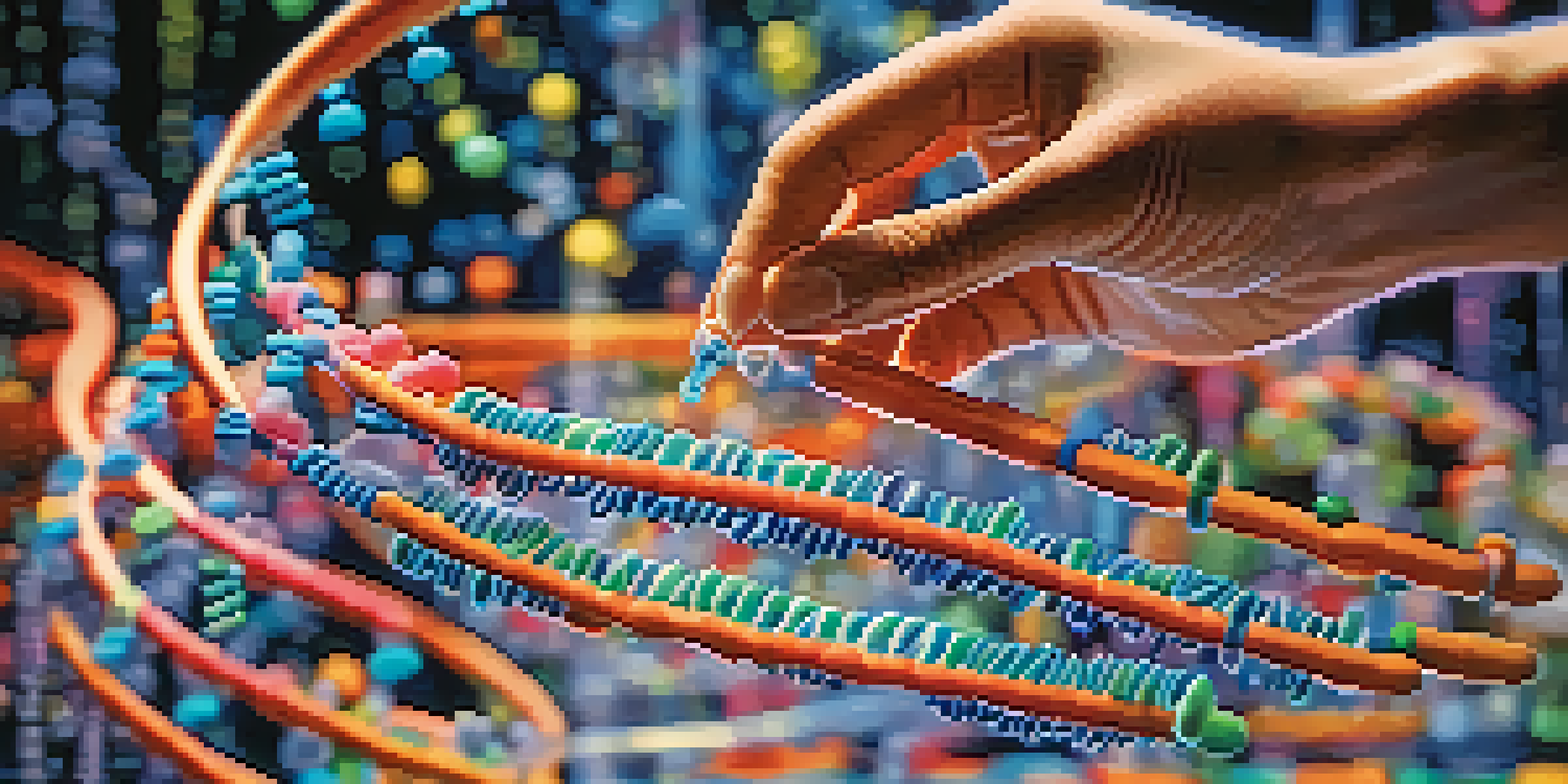The Role of Epigenetics in Disease: A Molecular Perspective

What is Epigenetics and Why Does It Matter?
Epigenetics refers to the study of changes in gene expression that do not involve alterations to the underlying DNA sequence. Imagine a light switch that can turn genes on and off without changing the wiring; that's essentially what epigenetics does. These modifications can be influenced by various factors, including environment, lifestyle, and even diet, making it a vital area of research in understanding diseases.
The environment can influence gene expression, and what we do and how we live can affect our health.
Understanding epigenetics is crucial because it helps explain why two individuals with the same genetic makeup can experience different health outcomes. For instance, identical twins may have the same genes but may develop different diseases based on environmental exposures and lifestyle choices. This concept underscores the complexity of health and disease, illustrating that our genetic code is not our destiny.
Moreover, epigenetic changes can be reversible, offering potential pathways for therapeutic interventions. By targeting these modifications, scientists hope to develop new treatments that could effectively reverse the effects of certain diseases, making epigenetics an exciting frontier in medical research.
How Epigenetics Influences Disease Development
Epigenetic alterations can lead to the activation or silencing of genes that play pivotal roles in disease processes. For example, certain cancers can arise when tumor suppressor genes are turned off due to epigenetic modifications. This alteration can prevent the body from regulating cell growth, leading to uncontrolled proliferation and tumor formation.

Similarly, in autoimmune diseases, epigenetic changes can cause the immune system to mistakenly attack healthy cells. These modifications can affect how immune cells recognize and respond to potential threats, illustrating the profound impact epigenetics has on our immune response and overall health. Such scenarios provide a clear link between epigenetics and disease.
Epigenetics: Beyond DNA Changes
Epigenetics studies gene expression changes influenced by environment and lifestyle, showing that genetics is not our sole determinant of health.
In neurodegenerative disorders like Alzheimer's disease, epigenetic changes can disrupt the normal functioning of neurons. Research indicates that specific epigenetic modifications may contribute to the cognitive decline seen in these conditions, further emphasizing the importance of understanding how these changes affect brain health.
Environmental Factors and Epigenetic Changes
Our environment plays a significant role in shaping our epigenetic landscape. Factors such as pollution, diet, stress, and even social interactions can lead to changes in gene expression. For instance, studies have shown that a diet rich in fruits and vegetables can promote beneficial epigenetic changes, potentially lowering the risk of chronic diseases.
Epigenetics is the key to understanding how our environment interacts with our genes, defining our health and diseases.
Conversely, exposure to toxic substances, like heavy metals or chemicals, can lead to detrimental epigenetic modifications. These changes may increase the likelihood of developing diseases such as cancer or cardiovascular issues, illustrating how our surroundings can profoundly influence our health at a molecular level.
Even lifestyle choices like smoking or excessive alcohol consumption can result in epigenetic alterations that contribute to disease risk. Recognizing the impact of these external factors empowers individuals to make informed choices that promote better health outcomes, showcasing the dynamic interplay between environment and genetics.
Epigenetics in Cancer: A Closer Look
Cancer is perhaps the most studied area in epigenetics, with researchers uncovering how epigenetic modifications can drive tumorigenesis. Abnormal methylation patterns, for example, can silence genes that typically suppress tumors. This silencing can pave the way for cancer cells to thrive and multiply unchecked.
Targeting these epigenetic changes presents an exciting opportunity for cancer treatment. Drugs that reverse these modifications, known as epigenetic therapies, are being developed to reactivate silenced tumor suppressor genes and inhibit cancer progression. This innovative approach highlights the potential of epigenetics in designing more effective cancer therapies.
Environmental Impact on Health
Factors like diet, pollution, and stress can lead to epigenetic modifications that significantly affect disease risk and overall health.
Moreover, understanding a patient's unique epigenetic profile can help personalize treatment strategies. By tailoring therapies based on specific epigenetic alterations, healthcare providers can improve treatment efficacy and minimize side effects, showcasing the promise of epigenetics in revolutionizing cancer care.
Epigenetics in Mental Health Disorders
Emerging research suggests that epigenetic mechanisms play a significant role in mental health disorders such as depression and anxiety. Changes in gene expression associated with stress and trauma can lead to altered brain function, contributing to the development of these conditions. This connection offers a new perspective on how our experiences can impact our mental well-being.
For instance, individuals exposed to chronic stress may experience epigenetic modifications that affect neurotransmitter systems, potentially leading to mood disorders. Understanding these changes can illuminate why some people are more vulnerable to mental health issues, despite similar life experiences.
Innovative therapies targeting these epigenetic changes are being explored to treat mental health conditions. By addressing the molecular underpinnings of these disorders, researchers hope to develop new strategies that could improve treatment outcomes and enhance quality of life for those affected.
Potential for Epigenetic Therapies in Disease Treatment
The potential for epigenetic therapies is vast, with ongoing research aimed at harnessing these molecular changes for therapeutic benefit. These therapies could offer a way to correct harmful epigenetic modifications that contribute to diseases, leading to innovative treatments for conditions like cancer, autoimmune diseases, and mental health disorders.
For example, drugs that inhibit enzymes responsible for adding or removing epigenetic marks are being tested in clinical trials. These treatments aim to restore normal gene function, providing hope for patients who have limited treatment options with traditional methods.
Therapeutic Potential of Epigenetics
Emerging epigenetic therapies aim to reverse harmful gene modifications, offering hope for treating various diseases, including cancer and mental health disorders.
However, as promising as these therapies are, challenges remain. Understanding the complexities of the epigenome and ensuring targeted delivery to specific tissues are critical hurdles that researchers are working to overcome. Nevertheless, the future of epigenetic therapies holds great promise in transforming how we approach disease treatment.
The Future of Epigenetics in Medicine
As our understanding of epigenetics continues to grow, its implications for medicine are becoming increasingly clear. The potential to manipulate epigenetic changes opens new avenues for personalized medicine, where treatments are tailored to an individual's unique genetic and epigenetic makeup. This approach could lead to more effective therapies with fewer side effects.
Future research will likely focus on mapping the human epigenome, akin to the Human Genome Project, to identify specific epigenetic changes associated with various diseases. Such knowledge could revolutionize our understanding of disease mechanisms and lead to breakthroughs in prevention and treatment strategies.

Moreover, integrating epigenetic information with traditional genetic data will enhance our ability to predict disease risk and tailor interventions. As we stand at the cusp of this exciting frontier in medicine, the role of epigenetics in shaping our health and disease outcomes cannot be overstated.